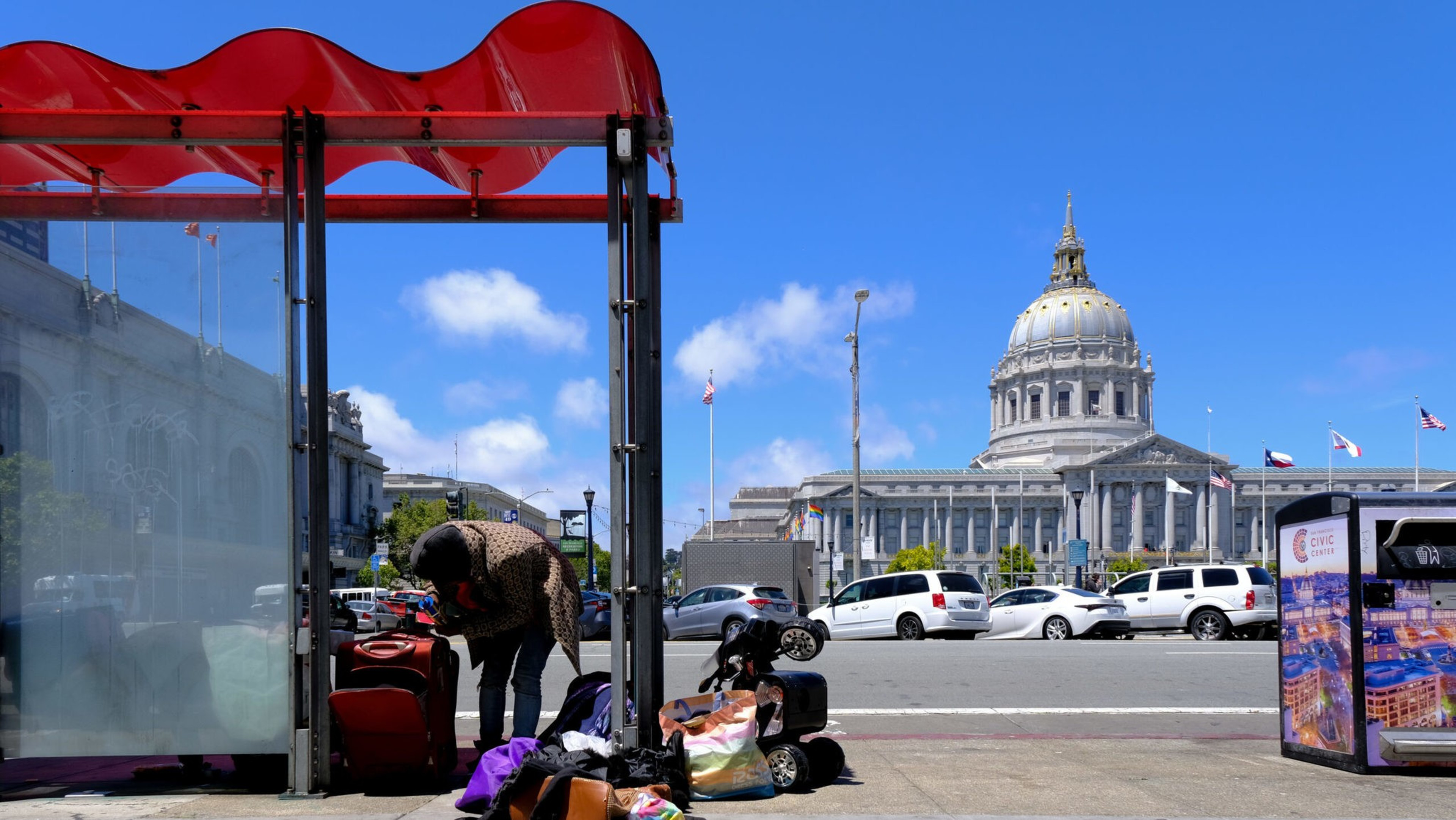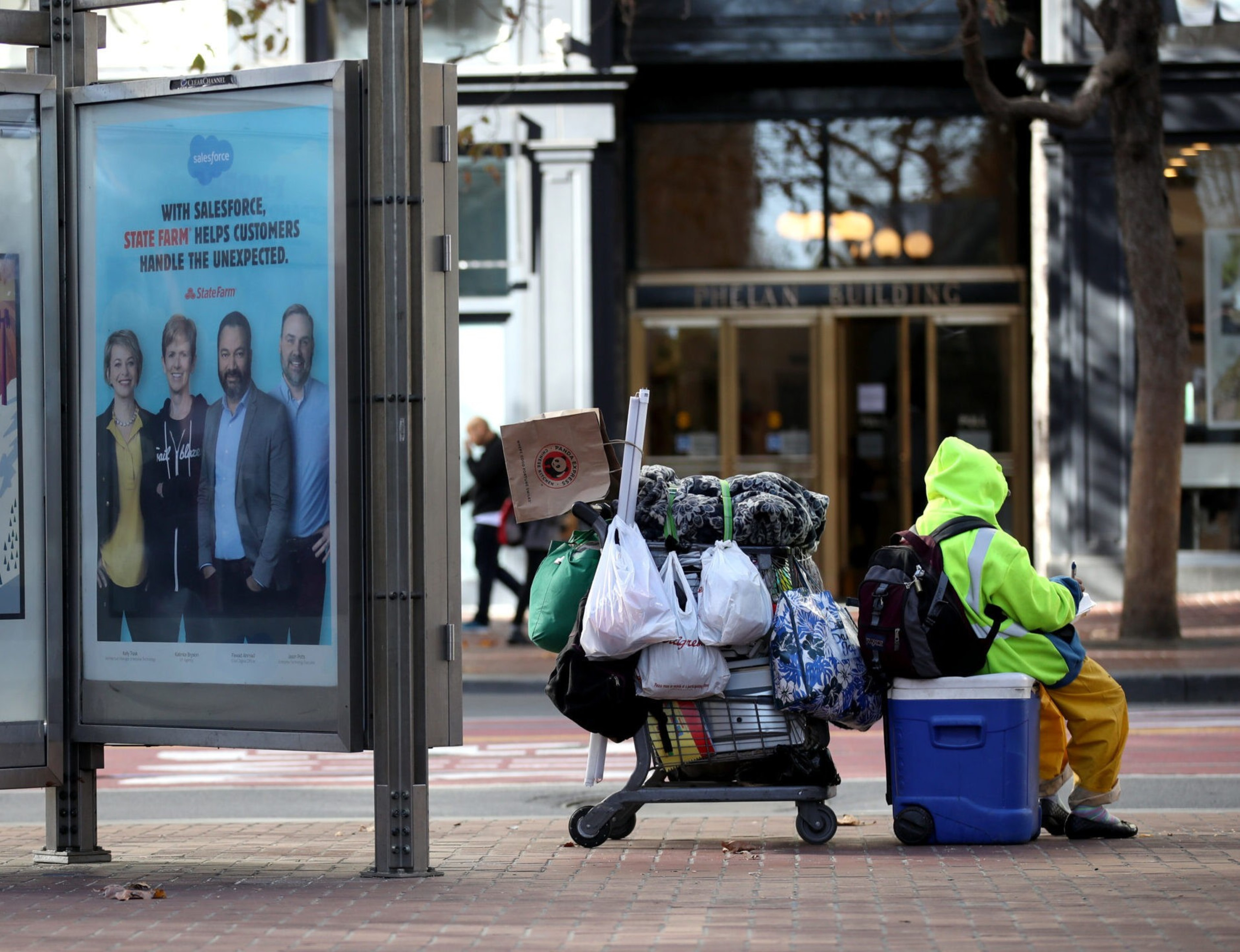A plan to create a new team to respond to homelessness-related concerns received a stamp of approval at the San Francisco Board of Supervisors, but details on how it would integrate with existing city services are murky.
The proposal, dubbed the Compassionate Alternative Response Team (CART) and put forth by a group of advocates called the CART Coalition, seeks to reroute low-priority complaints from the San Francisco Police Department to its proposed team of 52 workers. The group estimates that the plan will cost about $6.8 million dollars to build and operate the response teams, who would receive training and earn annual compensation of $90,000 per employee.
On Tuesday, the Board of Supervisors unanimously approved a resolution supporting the creation of CART, though the resolution itself doesn’t guarantee that will happen. Supervisor Matt Haney, who sponsored the resolution, described it at a June 10 hearing as an expression of “the need generally for this type of model.” Actually funding the teams would require a more formal budget appropriation process, which isn’t likely to happen in time for the upcoming fiscal year 2022 budget.
“We are clearly not doing something right when we are relying on institutional responses to calls that don’t require police,” said Vinny Eng, an organizer for the CART Coalition at a June 10 hearing about the plan.

As outlined in a presentation (opens in new tab) to the Board of Supervisors, CART says it could respond to encampment complaints and all homeless-related, Priority C 911 calls in lieu of police, in addition to setting up its own separate hotline for calls. It is modeled after a community program called CAHOOTS based in Eugene, Ore. that intervenes in mental illness, homelessness and addiction-related crises.
Priority C calls are those that carry no present danger to life or property, and include anything from loitering, panhandling and trespassing calls to wellness checks for people appearing to be in distress. Under the city’s current system, many of these calls are already routed to non-police teams.
CART, if funded, would join a growing alphabet soup of teams responding to street-level calls in lieu of police.
Calls involving a psychiatric or other crisis, for example, may be routed to a Street Crisis Response Team (SCRT) within the San Francisco Fire Department. Likewise, wellness checks may be routed to a Street Wellness Response Team (SWRT), a group of community paramedics also overseen by SFFD. Overdoses are often handled by SFFD paramedics, and Mayor Breed is requesting that the city also fund dedicated Street Overdose Response Teams (SORT) as part of her proposed budget. Calls regarding homeless encampments are routed to the city’s 311 customer service center and handled by the Healthy Streets Operations Center (HSOC), a joint effort by the Department of Homelessness and Supportive Housing, the Department of Public Health and the police.
Groups responding to homelessness also include Homelessness Outreach Teams (HOT) focused on referrals and case management, which is overseen by the Department of Homelessness; a Crisis Intervention Team managed by SFPD; and SFFD’s EMS-6 paramedic teams, which respond to all manner of medical emergencies.
For some policymakers, the number of teams involved in street response raises concerns of duplication and inefficiencies in efforts to manage homelessness-related calls, which members of the public generally place to either 311 or 911 depending on the urgency of the situation.
“In total, we have a proposed nine teams that we are going to be reviewing during this budget process to respond to people in need on the streets of San Francisco,” said Supervisor Hillary Ronen at a June 9 hearing focused on street response. “I am watching this and seeing a disaster unfold. Nine teams is too much.”
The Department of Emergency Management says that between 911, 311 and the police non-emergency line, the city processed more than 65,000 calls deemed homelessness-related in 2019. It fielded more than 26,000 total trespassing calls and 23,000 suspicious person calls, many of which are homelessness-related.
San Francisco has seen its homeless population rise steadily (opens in new tab) over the past decade, from approximately 5,400 individuals in 2011 to 8,000 in 2019, an increase of 67 percent according to the city’s biennial counts. State data points to a surge in homelessness (opens in new tab) during the COVID pandemic.
Meanwhile, as part of a local reform effort, Mayor London Breed announced last year that the city would reduce its reliance on police for non-criminal complaints. Police chief Bill Scott has largely embraced the idea of diverting such calls, and said the department identified 23 categories of calls that it believes can be “reenvisioned.”
CART says that its proposed model is more responsive to individuals for whom “institutional” intervention, whether by police or even emergency medical responders, may cause trauma. The group says that its “consent-based” approach will be more effective than existing responses.
“That’s right, and there are a number of reasons for this: We know that racial disparities exist, health disparities exist,” said Eng, in response to a question by Supervisor Catherine Stefani about whether a fire department response was upsetting or triggering to some.
“I do feel that bias [against] institutional response—and I’m just talking about paramedics and firefighters, not police—may potentially put some people in harm that need care,” Stefani responded.
CART is requesting (opens in new tab) to take over spillover psychiatric calls that Street Crisis Response Teams cannot handle, wellbeing checks, and homeless-related trespassing, suspicious person, aggressive panhandling and other Priority C calls, as well as encampment complaints otherwise routed to 311. According to various scenarios presented to the board, the group aims to focus on conflict resolution and “education services” in situations involving a complaint by a housed person.
Despite broad agreement that police be removed from many homelessness-related calls, some city officials are wary of shifting responsibilities to an organization not governed by the city’s emergency services. Moreover, it is not yet clear whether CART would be able to comply with strict regulatory standards required for medical responses, and how its hotline would integrate with existing services.
“We do not agree with excluding the Fire Department, Department of Public Health, and others who already have the expertise and training to get this program going immediately,” said Andy Lynch, a spokesperson for Mayor Breed. “CART could not take calls that the pilot street crisis response teams will take because these calls require an immediate response, which is not possible when the teams are not directly synced with the City’s Emergency Communications Channels. We want all of our outreach teams to be working together to field requests as they come in and conduct proactive outreach.”
The city currently funds six Street Crisis Response Teams, and Breed hopes to fund a seventh that would spin up in the next few months. The four teams that are currently up and running have responded to more than 1,000 calls in their first five months of operation, according to the Mayor’s Office.
Final deliberations for the upcoming budget are scheduled for next week, and Breed is expected to sign the budget by August 1.
